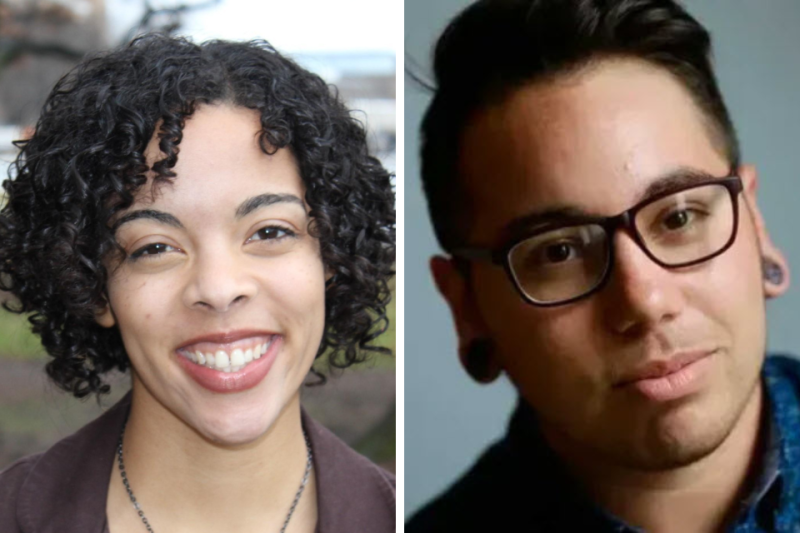
Through a new National Institutes of Health grant, Sarah “Sadie” Wilson, PhD, hopes to reduce inequities that place Latinx individuals at higher risk of HIV. She’s partnering with her friend and colleague, Joaquin Carcaño, director of southern health policy at Latinos in the South, to launch a community-based, equity-focused initiative in the Charlotte, North Carolina area.
Latino gay and bisexual men comprised nearly a quarter of the estimated 34,800 new HIV infections in the U.S. in 2019. Additionally, one third of Latina transgender women surveyed in a recent national Centers for Disease Control and Prevention (CDC) study are living with HIV, and new HIV infections are more common among Latina women than non-Hispanic White women. Social and structural issues such as racism, xenophobia, HIV stigma, homophobia, transphobia, poverty, immigration policy, language barriers, and limited access to high-quality health care have influenced health outcomes and continue to drive inequities.
Effective preventive HIV treatment—pre-exposure prophylaxis (PrEP), an antiretroviral medication—is widely available to people without HIV who may be exposed to HIV through sex or injection drug use. The once-daily pill decreases the risk of contracting HIV from injecting drugs by 74 percent and the chance of contracting HIV through sex by 99 percent. However, many people at risk for HIV are unaware of its life-changing benefits; this problem is particularly prevalent in the Latino community.
“Some Latinx people may not use HIV prevention services due to lack of information, service offerings in Spanish, or accessible clinic locations or hours. Systemic barriers can also come into play, like fear of disclosing immigration status, racism and xenophobia, LGBTQ+ stigma, and HIV stigma.”
— Sadie Wilson, PhD
“A small percentage of Latinos who would benefit from PrEP use it, which is tragic, because if taken as prescribed, it’s highly effective for preventing HIV,” said Wilson, an assistant professor in psychiatry and behavioral sciences and associate director of the Duke Center for AIDS Research Social and Behavioral Sciences Core. “Some Latinx people may not use HIV prevention services due to lack of information, service offerings in Spanish, or accessible clinic locations or hours. Systemic barriers can also come into play, like fear of disclosing immigration status, racism and xenophobia, LGBTQ+ stigma, and HIV stigma.”
That apprehension is part of a larger trend, says Wilson. “Similar equity-related barriers are pervasive throughout the continuum of HIV care. That goes from prevention of HIV with PrEP, to HIV testing, to initiating and staying in HIV treatment.”
Last year, a conversation with Carcaño sparked an idea that led to the NIH grant, aimed at increasing use and persistence of PrEP among Latinos in Mecklenburg County. The county is one of 57 jurisdictions in the CDC’s “Ending the HIV Epidemic in the U.S.” initiative, and the only one in North Carolina.
The grant, which relies heavily on voices from the community, reflects an innovative, grassroots-level solution with the long-term goal of changing harmful systems and getting at the heart of key HIV prevention challenges in the Latino community.
In the first year of the project, Wilson and Carcaño formed a workgroup of community members—including people taking PrEP, those who work in clinics, those living with HIV, experts from Latinos in the South (an immigration advocacy group), and other community organizers and advocates.
The workgroup will lead the design of a model implementation plan in North Carolina. The Duke team—including researchers from the School of Medicine Departments of Psychiatry & Behavioral Sciences and Population Health Sciences and the School of Nursing—will study the acceptability and feasibility of this community-based and equity-focused approach. If the model proves effective, Wilson and Carcaño hope it can be replicated across the U.S. South.
A comprehensive systematic review of the county, completed by Duke School of Nursing student Lisvel Matos and her advisor, associate professor Rosa Gonzalez-Guarda, PhD, MPH, RN, CPH, FAAN, has already shed light on existing barriers and facilitators.
“I hope that as health equity grows as a field, health researchers will pause to consider the possibility of taking a supporting role and allow others with more direct lived experience take primary roles.”
— Sadie Wilson, PhD
Reflecting on the structure of the project, Wilson noted, “I hope that as health equity grows as a field, health researchers will pause to consider the possibility of taking a supporting role and allow others with more direct lived experience take primary roles.”
She also highlighted the intentionality and importance of the project leaders—herself and Carcaño—having some shared experience with the study’s target population, including identifying as queer people of color with different ethnicities and personal experiences of systemic racism.
Wilson holds a secondary appointment in the Department of Population Health Sciences and a faculty affiliation in the Duke Center for Health Policy and Inequalities Research. She also serves as the co-lead of the Duke Sexual and Gender Minority Health Program and the LGBTQ+ veteran care coordinator for the Durham VA Health Care System.